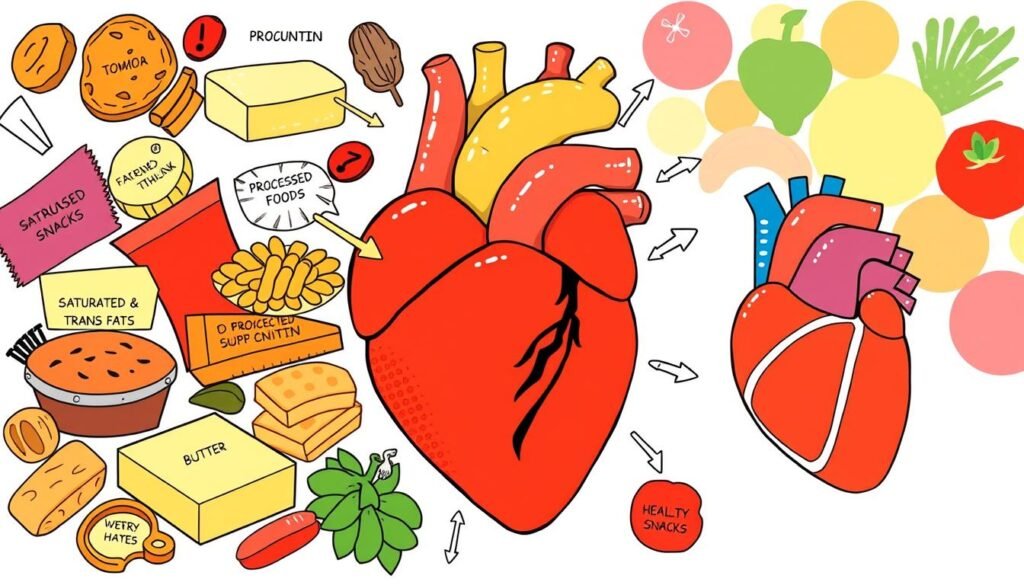Your diet impacts about 20% to 30% of your blood cholesterol. This shows how important your food choices are for cholesterol management and heart health. Even if you eat healthier, move more, and lose weight, it might not cut down your LDL or “bad” cholesterol enough. Things like your genes, hidden fats, and how you live can really change your cholesterol levels. Knowing these factors is key if you’re working towards a healthier heart. For tips on effective lifestyle changes to lower cholesterol, keep reading.
Key Takeaways
- Diet affects 20% to 30% of blood cholesterol levels.
- Managing saturated fat intake is vital for lowering cholesterol.
- The Mediterranean Diet shows benefits in reducing cardiovascular risk.
- Genetic factors can impact the effectiveness of lifestyle changes.
- Regular aerobic exercise can help improve cholesterol levels.
- Knowledge of LDL numbers is crucial for heart attack and stroke survivors.
Understanding Cholesterol and Its Importance
Cholesterol is key in our bodies, acting as a waxy substance. It helps make cells and hormones. Most of our cholesterol is made by the liver. Some comes from animal foods. We need to know about different cholesterol types for heart health.
There are two main cholesterol types: LDL and HDL. LDL is the “bad” type that can build up and cause heart problems. HDL is the “good” type because it removes LDL from our blood. It’s important to keep these types balanced.
Many things can change cholesterol levels. Exercising for 30 minutes five days a week boosts “good” cholesterol. Stopping smoking quickly improves HDL levels. Watching your weight is critical. Even losing a little weight helps your cholesterol levels.
Eating foods with omega-3 fats, like salmon and walnuts, supports heart health. Whey protein in dairy can lower “bad” cholesterol and overall levels. It’s advised to limit saturated fats and keep daily cholesterol under 200 mg.
What is LDL Cholesterol and Why is it a Concern?
LDL cholesterol is known as “bad” cholesterol and affects heart health. It transports cholesterol from the liver to cells in the body. If there’s too much LDL, it leads to health problems.
High LDL cholesterol can cause fatty plaques to form in arteries. This makes it hard for blood to flow. It can lead to heart disease and strokes. Adults should keep their LDL below 100 mg/dL. For those with heart issues, it’s even more strict.
Having high LDL increases the risk of heart problems. It’s important to check cholesterol levels often. Adults should also work on increasing their HDL levels. This can help lower heart disease risk.
Many things affect LDL levels, like diet, weight, and exercise. Eating too many saturated fats raises LDL. But healthy eating and exercise can lower it. This improves health.
The Impact of Dietary Modifications on Cholesterol Levels
Changing what you eat plays a big role in controlling your cholesterol. It can affect your blood cholesterol by 20% to 30%. Knowing which foods make cholesterol go up and which ones bring it down helps keep your heart healthy.
Foods That Raise Bad Cholesterol
Some foods can make your LDL cholesterol – the bad kind – go up. These foods should be eaten less:
- Saturated fats, found in things like processed meats, treats, and full-fat dairy.
- Trans fats, seen in fried foods and store-bought snacks.
- Highly processed foods that have hydrogenated oils in them.
Foods That Help Lower Bad Cholesterol
Eating foods that lower cholesterol can reduce the risks of high LDL levels. These foods are good for you:
- Oats and barley, full of soluble fiber, lessen cholesterol absorption.
- Legumes like beans and lentils, packed with fiber for the heart.
- Avocados and nuts, with monounsaturated fats, are good for cholesterol levels.
- Fatty fish, including salmon and mackerel, have lots of omega-3s, which are great for your heart.
| Food Category | Impact on Cholesterol |
|---|---|
| Saturated Fats | Raises LDL cholesterol |
| Trans Fats | Raises LDL cholesterol; lowers HDL cholesterol |
| Soluble Fiber | Lowers LDL cholesterol |
| Monounsaturated Fats | Improves overall cholesterol profile |
| Omega-3 Fatty Acids | Helps lower triglyceride levels |
Talking to a dietitian can help create a diet plan that fits your life. This ensures you manage your cholesterol well with the right foods.
Lifestyle Changes to Lower Cholesterol: The Basics
Making lifestyle changes is a great way to improve heart health. Doing regular exercise and keeping a healthy weight are key. They help manage cholesterol levels together, showing how important it is to look at heart health as a whole.
Physical Activity and Its Role in Cholesterol Management
Physical activity greatly impacts cholesterol. It boosts “good” cholesterol and lowers the “bad” kind. Walking, biking, and swimming are great for your heart. The American Heart Association recommends 30 to 60 minutes of exercise most days for best results.
Weight Management: A Key Factor
Managing your weight is crucial for cholesterol control. Losing 5-10 percent of your weight can improve your cholesterol. This not only helps your heart but is achieved by diet and exercise. Choosing healthier foods and staying active are vital for long-term cholesterol management.
To sum up, being more active and managing weight are big steps towards better health. To tailor a plan that fits you, speak with a healthcare expert. For more info on handling cholesterol, visit heart.org.
The Genetic Link: Familial Hypercholesterolemia
Familial Hypercholesterolemia (FH) is a genetic condition that causes very high LDL cholesterol levels. People with FH have high cholesterol, no matter their lifestyle. This is because of their genes. It is common in certain groups like French Canadians, Ashkenazi Jews, Lebanese, and Afrikaners. Sadly, over 90% of people with FH don’t know they have it. Knowing your family’s health history is crucial.
To manage FH, both lifestyle changes and medications are needed. Healthy living helps but isn’t enough on its own. Doctors advise staying active, eating well, not smoking, and drinking less alcohol. Medicines called statins are key, lowering LDL cholesterol by over half. Other treatments include cholesterol blockers, bile acid binders, and PCSK9 inhibitors.
In tough cases, a procedure called LDL apheresis might be used. This removes bad cholesterol from your blood. It’s vital to catch FH early. Kids might need statins starting between ages 8 and 10. If one parent has FH, their children have a 50% chance of having it too. If both parents have it, the children will definitely have FH. For the most severe type of FH, liver transplant or other serious treatments may be needed.
To learn more about FH and how to deal with it, check out this link. Keeping an eye on cholesterol with the right treatment improves life for people with FH.
Hidden Fats: Understanding Saturated and Trans Fats
It’s key to know about fats for a healthy heart. Saturated and trans fats can raise cholesterol, upping heart disease risk. Learning where these fats come from helps us choose better for our hearts.
Sources of Saturated Fats
Saturated fats come from animal products and some oils. Here’s where they’re found:
- Processed meats (sausage, bacon, hot dogs)
- Certain dairy products (butter, cheese, cream)
- Fast food and fried foods
- Some baked goods (cookies, pastries, cakes)
- Coconut oil and palm oil
These items can push up LDL cholesterol, which is bad for the heart.
Effective Strategies to Reduce Trans Fats
Trans fats are in baked and fried foods, harming the heart by messing with cholesterol levels. Here are ways to cut back:
- Choose lean proteins like chicken, turkey, and legumes.
- Check food labels for partially hydrogenated oils— a sign of trans fats.
- Use healthy oils like olive or avocado oil instead of saturated fats.
- Eat fewer commercially baked and fried foods.
- Add more fruits, vegetables, and whole grains to your meals.
Being smart about these fats is crucial for heart health. For more on trans fats and their dangers, click here.

The Role of Smoking Cessation in Lowering Cholesterol
Smoking badly affects heart health by changing cholesterol levels. Smokers usually have higher LDL (bad cholesterol) and lower HDL (good cholesterol). Stopping smoking is key to managing cholesterol levels well.
Quitting smoking improves cholesterol levels. People who stop smoking tend to see their HDL cholesterol increase. This can return to non-smoker levels within a year. A major study found that HDL-C goes up by 0.107 mmol/L, showing big health benefits.
Having support when quitting smoking is critical. Counseling, support groups, and medicines like varenicline (Chantix) and bupropion (Zyban) help people beat nicotine addiction. These aids improve not only cholesterol levels but overall heart health too.
Quitting smoking cuts heart disease risk in half after just one year. In 15 years, the risk can be as low as someone who never smoked. This shows how important stopping smoking is for heart health.
Alcohol Moderation: Finding the Right Balance
Alcohol affects cholesterol and heart health in complex ways. The American Heart Association says moderate drinking means up to two drinks a day for men. One drink a day for women. A drink is 12 ounces of beer, 5 ounces of wine, or 1.5 ounces of spirits. Finding the right amount to drink is key for good health.
Drinking too much can lead to serious health issues. These include high blood pressure, liver disease, and more depression. Binge drinking raises these risks. It’s defined as five or more drinks for men or four for women in two hours. Drinking a lot over time can increase fats in your blood. This builds up in arteries, raising the risk of heart attack and stroke.
Some research says moderate wine drinking might be good for the heart. But these studies often ignore other healthy habits that people have. There’s no strong proof that drinking a little alcohol lowers heart disease for everyone. People with diabetes need to be careful with alcohol. It can make their blood sugar go too high.
Alcohol is off-limits for pregnant women due to the risk of birth defects. Women who are breastfeeding should drink very little. This protects their baby’s brain. Also, mixing alcohol with certain medicines like aspirin can increase the risk of bleeding. Always check with a doctor if you’re taking medication.
Drinking mindfully is part of staying healthy. This also includes exercising regularly, eating well, and managing stress. Techniques like meditation can help too. Even though moderate drinking might increase “good” cholesterol, moderation is still critical for the best health.

Stress Reduction and Its Impact on Heart Health
Chronic stress can seriously affect your heart. It often leads to higher bad cholesterol levels. This increases the risk of heart disease and stroke. Reducing stress is crucial for a healthy heart and lifestyle.
Adding stress management to your daily life improves well-being. It helps with efforts to lower cholesterol. Activities like regular exercise, mindfulness, and meditation boost your heart health.
Experts say exercising for 150 minutes a week is good for your heart. It keeps your blood pressure and cholesterol low.
Losing 5% to 10% of your weight can also help. It lowers the risk of blood pressure and cholesterol problems. Stress can make you overeat and live poorly. It’s important to get 7 to 9 hours of sleep each night. Not sleeping enough or drinking too much alcohol can harm your health.
Using stress reduction methods helps your heart by making you live healthier. Managing stress stops health problems caused by too much pressure. To learn more about stress management and heart health, check out this resource.
| Stress Factor | Impact on Heart Health | Recommended Action |
|---|---|---|
| Chronic Stress | Increases LDL cholesterol levels | Implement stress reduction techniques |
| Poor Sleep Quality | Heightens risk of heart disease | Aim for 7 to 9 hours of sleep |
| Unhealthy Lifestyle Choices | Contributes to high blood pressure and cholesterol | Focus on balanced diet and regular exercise |
It’s crucial to manage stress well to keep a healthy heart. Stress reduction methods are key, along with good diet and lifestyle choices.
Examining the Effectiveness of Plant-Based Diets
Plant-based diets help manage cholesterol levels well. These diets include fruits, vegetables, whole grains, and good fats. They have been effective in lowering bad cholesterol, or LDL.
This is essential for heart health, especially since many adults in the U.S. have high cholesterol. Reducing LDL cholesterol improves heart health significantly.
How Plant-Based Diets Can Influence Cholesterol
Switching to plant-based diets, like vegetarian or vegan, greatly affects cholesterol. Studies prove that these diets can cut LDL cholesterol by 10%. Foods such as legumes and whole grains reduce bad cholesterol and help the heart.
Making changes to what we eat can therefore bring big benefits for heart health. Adjusting dietary habits can have a huge impact on cardiovascular health.
Benefits of Heart-Healthy Fats and Whole Grains
Adding foods with healthy fats, like avocados, nuts, and olive oil, boosts plant-based diets. These fats help lower bad cholesterol without hurting good cholesterol, HDL. Whole grains are also important because they offer nutrients and fiber. This helps lower overall cholesterol.
By cutting down on saturated fats and eating more unsaturated fats, the risk of heart disease drops. Following plant-based diet principles leads to healthier cholesterol levels and better heart health in the long run.
| Diet Type | LDL Cholesterol Reduction | Other Benefits |
|---|---|---|
| Vegetarian | 10% | Lower risk of heart disease |
| Vegan | 15-30% | Improved weight management |
| Mediterranean | Varies | Incorporates fish and promotes diversity in food |

Conclusion
Managing cholesterol well is key to keeping your heart healthy. It also lowers the chance of getting heart disease. By making smart choices in our daily lives, we can improve our cholesterol. It helps to eat foods good for your heart and reduce saturated fats.
Eating things like oats, avocados, and lean meats can make a big difference. These changes in your diet can greatly drop bad cholesterol and raise good cholesterol.
Adding regular workouts, keeping a healthy weight, and stopping smoking can boost these effects. Studies have found that exercise can increase good cholesterol while decreasing bad cholesterol. Losing just a little weight can also have big benefits.
It is important to work with doctors to find the best plan for you. This ensures the best results.
Combining healthy habits and doctor advice improves cholesterol and overall health. Being aware and taking action against high cholesterol helps avoid heart disease. This is a major step towards a healthier future for many.